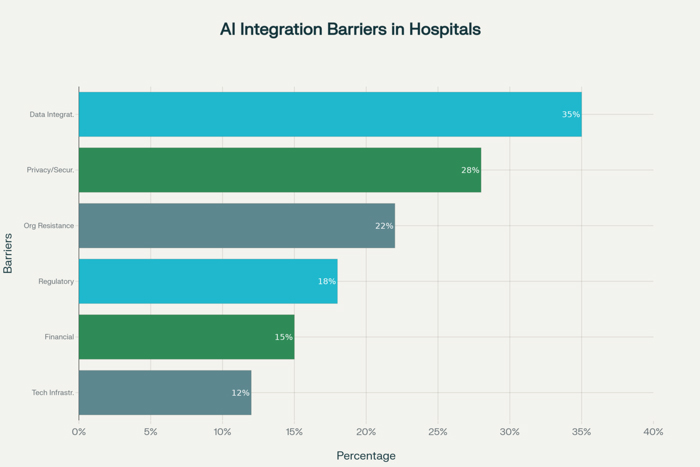Breaking Down Barriers: Overcoming AI Integration Challenges in Hospital Management Systems
The healthcare industry stands at a transformative crossroads, where artificial intelligence promises revolutionary improvements in patient care, operational efficiency, and clinical outcomes. Yet despite mounting evidence of AI’s potential, hospital administrators across the globe continue to grapple with significant implementation challenges that prevent widespread adoption. Understanding and addressing these barriers has become crucial for healthcare leaders seeking to harness AI’s transformative power while maintaining the highest standards of patient care and operational excellence.
The current landscape reveals a stark contrast between AI’s demonstrated capabilities in research environments and its limited real-world application in hospital settings. While academic studies consistently show impressive results, the translation from laboratory to bedside remains fraught with obstacles that require strategic leadership and systematic approaches to overcome.
The Complexity of Healthcare Data Integration
Modern hospitals generate enormous volumes of data across multiple systems, creating a fragmented information ecosystem that poses significant challenges for AI implementation. Electronic Health Records, imaging systems, laboratory information systems, and monitoring devices often operate in isolation, creating data silos that prevent comprehensive AI analysis. This fragmentation represents one of the most fundamental AI integration challenges hospitals face today.

The heterogeneous nature of healthcare data further complicates integration efforts. Clinical notes exist in unstructured formats, imaging data requires specialized processing capabilities, and laboratory results follow different coding standards across departments. These inconsistencies create substantial obstacles for AI systems that require clean, standardized datasets to function effectively.
Hospital administrators must recognize that successful AI integration demands a comprehensive data governance strategy that addresses quality, accessibility, and standardization simultaneously. Organizations that invest in robust data infrastructure before implementing AI solutions consistently achieve better outcomes than those attempting to address these issues retroactively.
Data interoperability emerges as another critical consideration, particularly as hospitals seek to implement AI solutions that span multiple departments or integrate with external healthcare networks. The absence of universal data exchange standards creates additional complexity for AI systems attempting to access comprehensive patient information across different platforms and providers.
Privacy and Security Considerations in AI Deployment
Healthcare organizations operate under some of the most stringent data protection regulations in any industry, with frameworks like HIPAA and GDPR establishing strict requirements for patient information handling. These regulatory requirements create significant AI integration challenges hospitals must navigate carefully during implementation planning and execution.
The tension between AI’s need for comprehensive data access and healthcare’s privacy requirements demands sophisticated technical solutions that protect patient confidentiality while enabling effective AI functionality. Organizations must implement privacy-by-design approaches that embed data protection measures directly into AI systems rather than treating security as an afterthought.
Cybersecurity concerns amplify these challenges, particularly as AI systems introduce new potential attack vectors that malicious actors might exploit. Hospital administrators must ensure that AI implementations include robust security measures that protect against both traditional cyber threats and AI-specific vulnerabilities such as adversarial attacks or model poisoning.
The complexity of maintaining patient consent in AI-driven environments adds another layer of consideration. Patients must understand how their data will be used in AI systems, what decisions these systems will influence, and what safeguards exist to protect their privacy throughout the process. This transparency requirement demands clear communication strategies and comprehensive consent management systems.
Organizational Resistance and Change Management
Perhaps the most challenging aspect of AI implementation lies not in technical considerations but in human factors that influence adoption success. Healthcare professionals, from physicians to nurses to administrative staff, often express skepticism about AI systems that might alter established workflows or challenge traditional decision-making processes.
This resistance frequently stems from legitimate concerns about AI reliability, particularly in high-stakes clinical environments where incorrect decisions can have severe consequences. Healthcare professionals require substantial evidence that AI systems will enhance rather than compromise patient care before embracing these technologies in their daily practice.
The fear of job displacement, while often overstated, represents a real concern that hospital administrators must address proactively. Effective change management strategies focus on positioning AI as a tool that augments human capabilities rather than replacing healthcare professionals, emphasizing how AI can eliminate routine tasks and allow staff to focus on more complex, patient-centered activities.
Training and education programs play crucial roles in overcoming organizational resistance, but these initiatives must go beyond basic technical instruction to address the underlying concerns and misconceptions that fuel skepticism. Successful programs combine hands-on experience with AI tools, peer-to-peer learning opportunities, and clear demonstrations of AI’s value in improving patient outcomes.
Workflow Integration and Operational Challenges
Integrating AI systems into existing hospital workflows requires careful analysis of current processes and strategic planning to minimize disruption while maximizing benefits. Many AI implementations fail because they require significant changes to established workflows without providing clear guidance on how staff should adapt their daily routines.
Successful workflow integration demands close collaboration between AI developers, hospital administrators, and frontline staff to identify optimal integration points that enhance rather than complicate existing processes. This collaborative approach helps ensure that AI systems align with actual operational needs rather than theoretical requirements.
The timing of AI interventions within clinical workflows presents another critical consideration. AI systems that provide recommendations at inappropriate moments in the care process may create workflow bottlenecks or generate alert fatigue among healthcare professionals. Careful analysis of clinical decision-making patterns helps identify optimal intervention points that support rather than interrupt natural workflow progression.
Customization capabilities become essential for addressing the unique workflow requirements of different hospital departments and specialties. AI systems that offer flexible configuration options allow administrators to tailor implementations to specific operational contexts, increasing the likelihood of successful adoption across diverse healthcare environments.
Financial and Resource Allocation Strategies
The financial implications of AI implementation extend far beyond initial technology acquisition costs to encompass training, infrastructure upgrades, ongoing maintenance, and potential workflow disruptions during deployment phases. Hospital administrators must develop comprehensive budgeting strategies that account for both direct and indirect costs associated with AI integration.
Return on investment calculations for healthcare AI prove particularly challenging because benefits often manifest as improved patient outcomes, reduced errors, or enhanced staff efficiency rather than immediate cost savings. Administrators need sophisticated measurement frameworks that capture these diverse value propositions while providing clear justification for AI investments to hospital boards and stakeholders.
Resource allocation decisions must balance the need for adequate AI implementation support with ongoing operational requirements. Many hospitals underestimate the human resources required for successful AI deployment, including data scientists, IT specialists, and clinical champions who can facilitate adoption among healthcare professionals.
Long-term sustainability considerations require hospitals to plan for ongoing AI system maintenance, updates, and potential scaling to additional departments or use cases. These future requirements should influence initial implementation decisions to ensure that AI investments can evolve with changing organizational needs and technological advances.
Regulatory Compliance and Quality Assurance
Healthcare AI systems must navigate complex regulatory landscapes that vary by jurisdiction and application type. Understanding these requirements and ensuring compliance throughout the implementation process requires significant expertise and careful planning that many hospitals struggle to manage effectively.
Quality assurance frameworks for AI systems in healthcare settings demand different approaches than traditional software testing, particularly for machine learning algorithms that may exhibit unexpected behaviors when encouned with novel data patterns. Hospitals must establish robust validation processes that ensure AI systems maintain accuracy and reliability in real-world clinical environments.
The dynamic nature of AI systems, particularly those that continue learning from new data, creates ongoing regulatory compliance challenges that traditional healthcare technologies do not present. Administrators must develop processes for monitoring AI system performance over time and ensuring continued compliance with relevant regulations.
Documentation requirements for healthcare AI systems often exceed those for other medical technologies, requiring comprehensive records of algorithm development, validation processes, and performance monitoring. These documentation demands require significant resources and expertise that hospitals must plan for during implementation phases.
Building Successful Implementation Strategies
Effective AI implementation in hospitals requires phased approaches that begin with clearly defined pilot projects and gradually expand to broader organizational deployment. This incremental strategy allows hospitals to identify and address challenges on a manageable scale before committing to large-scale implementations.
Stakeholder engagement throughout the implementation process proves critical for long-term success, requiring regular communication with clinical staff, administrative personnel, patients, and external partners. These engagement efforts should address concerns proactively while highlighting tangible benefits that AI systems provide to different stakeholder groups.
Measurement and evaluation frameworks must be established before AI deployment begins, providing objective metrics for assessing implementation success and identifying areas requiring adjustment. These frameworks should encompass technical performance metrics, user satisfaction measures, and clinical outcome indicators that demonstrate AI’s value proposition.
Continuous improvement processes ensure that AI systems evolve with changing organizational needs and technological capabilities. Hospitals that establish mechanisms for ongoing optimization and refinement consistently achieve better long-term outcomes than those treating AI implementation as one-time projects.
The path forward for hospitals seeking to overcome AI integration challenges requires strategic vision, systematic planning, and sustained commitment from leadership and staff alike. Organizations that approach AI implementation with comprehensive strategies addressing technical, organizational, and regulatory considerations position themselves to realize the full potential of these transformative technologies while maintaining the highest standards of patient care and operational excellence.
Success in healthcare AI implementation ultimately depends on recognizing that technology alone cannot drive transformation. Instead, successful hospitals combine advanced AI capabilities with thoughtful change management, robust training programs, and cultures that embrace continuous improvement and innovation in service of better patient outcomes.


















